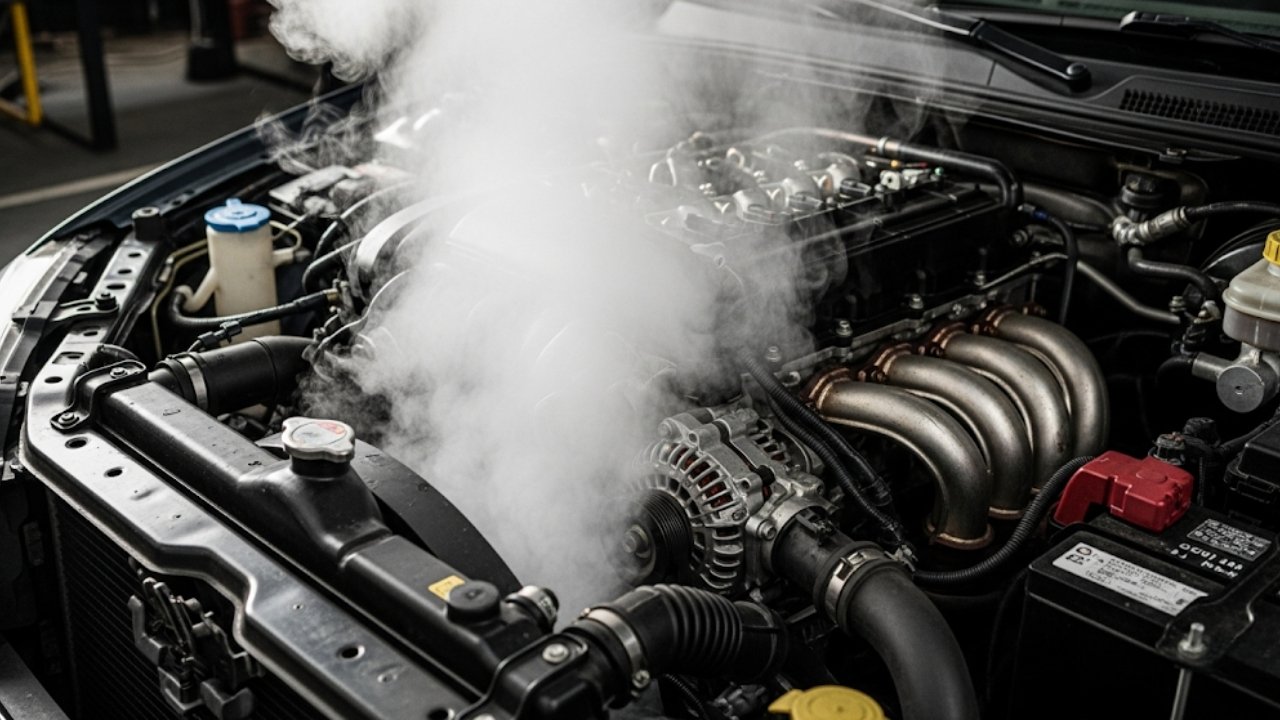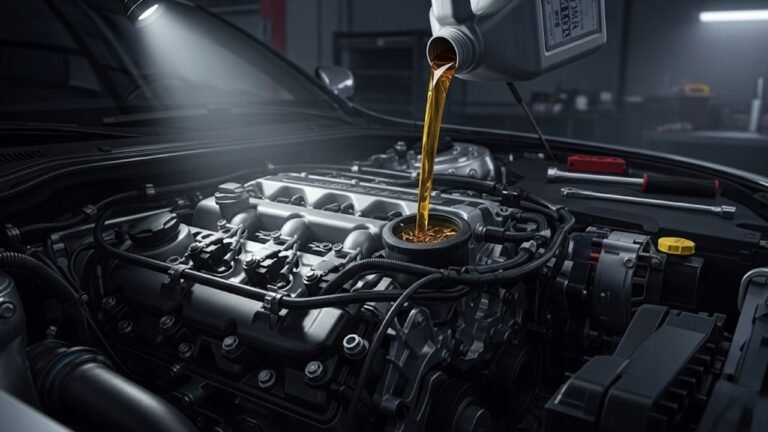Can Low Oil Cause Car to Overheat? Here’s the Honest Truth

Last summer, I was driving through the baking streets of Dhaka, late for a cousin’s wedding. The AC wasn’t helping, and to make matters worse, I noticed steam rising from my hood. My dashboard lit up like a Christmas tree—engine overheating. I pulled over, popped the hood, and stared at my poor Toyota like it had betrayed me.
But guess what? It was my fault.
A week earlier, I ignored the low oil warning thinking I’d “top it off later.” Turns out, I had pushed the engine too far without realizing the critical role that engine oil plays in keeping things cool. That day, I learned something most drivers never realize until it’s too late.
Can low oil cause car to overheat? Absolutely. And it’s more common than you’d think.
Let me walk you through why that happens, how you can prevent it, and what signs to watch for. Whether you’re driving an old Corolla or a shiny new SUV, this matters to everyone.
Why Oil Matters More Than You Think

When you start your car, thousands of tiny metal parts begin moving at lightning speed. They rub, spin, pump, and slam against each other. Without oil? It’s like running barefoot across burning coal.
Here’s what engine oil does:
-
Lubricates moving parts to reduce friction.
-
Cools down areas that coolant can’t reach.
-
Prevents metal-to-metal grinding.
-
Cleans by carrying debris to the oil filter.
-
Protects parts from rust and wear.
So, when your car is low on oil, the cooling system takes a major hit. Friction increases. Heat builds up. That’s when you smell burnt oil or hear knocking noises. And if ignored too long—kaboom. Your engine can overheat, seize, and die.
How Exactly Can Low Oil Cause Car to Overheat?
Let’s answer this directly: Can low oil cause car to overheat? Yes—and here’s how it happens.
When oil levels drop too low, two dangerous things begin to occur:
-
Less lubrication → More friction
Without enough oil, engine parts grind harder. That creates excess heat that coolant alone can’t handle. -
Poor heat transfer → Hotter engine
Oil acts like a sponge that absorbs and spreads heat. Low oil? No sponge. Heat gets trapped in parts like pistons, bearings, and cylinders.
In a normal situation, oil flows freely and carries away heat. But when it runs low, that cycle gets broken. It’s like trying to fry an egg on a dry pan—things get scorched fast.
Real-life Metaphor:
Imagine running a marathon in the scorching sun. You’re dehydrated, no water in sight. Muscles cramp, your body overheats, and eventually, you collapse. That’s your engine with low oil—overworked, undercooled, and overwhelmed.
Early Signs Your Car is Overheating Due to Low Oil
Sometimes the signs are subtle, like a whisper from your engine. Other times, it screams.
Watch for these clues:
-
Oil warning light turns on or flickers.
-
Engine temperature gauge rises above normal.
-
You hear knocking or ticking sounds.
-
There’s a burning smell from under the hood.
-
You spot smoke or steam from the engine bay.
These aren’t just coincidences. They’re your car saying, “Help me, I’m burning up!”
Table: Signs of Low Oil vs. Overheating
| Symptom | Cause | Urgency Level |
|---|---|---|
| Oil light on | Low oil pressure | High |
| Burning smell | Oil leaking onto hot surfaces | Medium |
| Engine runs louder | Poor lubrication | Medium |
| Temperature rising | Friction + trapped heat | Very High |
| Steam from hood | Coolant boiling due to excess heat | Critical |
If you notice more than one of these signs together, don’t drive. Pull over and check your oil level right away.
Low Oil vs. Low Coolant: What’s the Real Culprit?
Here’s a tricky one. People often confuse coolant issues with low oil problems, because both can cause overheating. But they affect your car in different ways.
Coolant (or antifreeze):
-
Flows through radiator and water jackets.
-
Cools surfaces outside the engine parts.
Engine oil:
-
Flows through internal parts.
-
Cools moving parts from the inside.
So while your coolant keeps the radiator and engine block cool, it’s the oil that prevents metal-on-metal friction that can create uncontrollable heat. That’s why both fluids are vital.
Think of it like a human body:
-
Coolant is your air conditioning (external comfort).
-
Oil is your blood (internal health).
Run low on either one? Trouble’s brewing.
How Often Should You Check Your Engine Oil?
I get it. Life’s busy. We all put off the small stuff until it becomes big. But if you want to avoid asking again, “can low oil cause car to overheat?”, then checking your oil regularly is key.
Here’s a simple rule I follow:
-
Every two weeks: Check your oil level.
-
Every 5,000 km or 3,000 miles: Change your oil, unless your car manual says otherwise.
-
Before long trips: Always inspect fluid levels.
Quick Tips for Checking Oil:
-
Park on a flat surface.
-
Wait for the engine to cool.
-
Pull out the dipstick, wipe it, reinsert, and check level.
-
Oil should be amber-colored and above the minimum mark.
If it’s dark, gritty, or low—change or top it up immediately.
Top Causes of Low Oil Levels That Lead to Overheating
Running low on oil isn’t always your fault. Sometimes, your car is secretly losing oil even if you never see a drop on the driveway.
Let’s break it down:
1. Oil Leaks
Oil can drip from:
-
Valve cover gaskets
-
Oil pan
-
Oil filter housing
If you notice dark spots under your car after parking, get it checked.
2. Burning Oil Internally
Engines can burn oil if the piston rings or valve seals wear out. You may see blue smoke from the exhaust.
3. Irregular Oil Changes
Old oil breaks down, becomes thick, and doesn’t circulate well. This leads to friction and—yep—overheating.
4. Faulty PCV Valve
This tiny part controls pressure in the engine. When it fails, oil consumption spikes, and your engine gets thirsty.
How to Prevent Overheating from Low Oil
You’ve probably heard that “prevention is better than cure.” When it comes to your car, that couldn’t be more true. Taking a few minutes every week to check your oil can save you thousands of dollars and countless headaches.
Here’s how to stay ahead of trouble:
-
Set a reminder on your phone to check oil every 2 weeks.
-
Learn your car’s normal behavior. If the temperature gauge ever climbs higher than usual, don’t ignore it.
-
Keep a quart of oil in your trunk—just in case.
-
Change your oil filter with every oil change. It helps keep the oil clean and flowing properly.
-
Park in clean spots so you can notice leaks early.
-
Don’t ignore any burning smell or ticking noise.
Your car gives hints before things go south. It’s like your body telling you it’s getting sick. Pay attention.
Topping Up Engine Oil: The Right Way
Let’s say your dipstick reads low. What now? Do you just pour in any oil from the shelf?
Not quite.
First, use the right oil. Your owner’s manual will specify whether you need 5W-30, 10W-40, synthetic or conventional. Using the wrong oil can mess up viscosity and pressure, leading to—you guessed it—overheating.
Safe steps to top up oil:
-
Wait for the engine to cool. Hot oil can burn you.
-
Locate the oil filler cap, usually marked with an oil can symbol.
-
Pour in a little (about ½ quart), wait a minute, and recheck the dipstick.
-
Add more slowly if needed—but don’t overfill!
-
Tighten the cap and run the engine for a minute.
Warning: Too much oil is also a problem. It can foam up, lose lubrication ability, and heat the engine further.
So if you ever wonder, can low oil cause car to overheat, remember—so can too much. Balance is key.
The Cost of Ignoring Low Oil Levels
Let’s get real for a second. Ignoring your oil level can cost more than just engine damage—it can ruin your entire car.
Here’s what’s at stake:
| Issue | Estimated Cost |
|---|---|
| Replacing a seized engine | $3,000 – $8,000 |
| Fixing warped cylinder heads | $1,500 – $3,000 |
| Repairing damaged pistons | $800 – $2,000 |
| New head gasket due to overheating | $1,200 – $2,500 |
And it’s not just about money. Think about being stranded with your family in the middle of nowhere. Or missing a job interview because your car overheated in traffic.
Oil is cheap. Engines aren’t.
Real Stories: What Happens When You Ignore the Signs
I met someone at a roadside tea stall once who had the worst engine horror story I’ve heard.
Rahim bhai, a rickshaw van repairman, saved up for years to buy a second-hand car. Just two months in, he ignored a low oil light thinking it was a glitch. He drove to Comilla in the summer heat with oil levels below the safe line.
His engine seized up halfway. It overheated, cracked the head gasket, and had to be towed back. Repair cost? 2.5 lakh taka. He had to sell the car for parts.
Don’t let that be your story.
FAQs About Overheating and Low Oil
1. Can low oil cause car to overheat even if coolant is full?
Yes. Coolant cools external parts, but oil cools the internal moving parts. Without enough oil, friction builds up heat faster than the coolant can handle.
2. How low is too low for engine oil?
If your dipstick shows oil below the minimum mark, it’s dangerously low. Even being slightly below can cause damage if driven for long.
3. Can synthetic oil reduce overheating risks?
Yes. Synthetic oils resist heat breakdown better, flow more consistently, and offer superior protection in extreme temperatures.
4. Can overheating damage the oil itself?
Absolutely. Overheating can burn and degrade the oil, reducing its ability to lubricate and cool. It becomes thicker and sludgy over time.
5. Is topping up oil enough to fix overheating?
Temporarily, yes. But if your engine has already overheated, it needs to be inspected for internal damage. Topping up won’t reverse wear or warping.
6. How often should I change my oil to prevent overheating?
For most cars, every 5,000 to 7,000 km is ideal. Older cars or harsh climates may require more frequent changes.
7. Can an oil filter cause overheating?
Yes. A clogged oil filter can restrict flow, reduce oil pressure, and cause poor lubrication—leading to overheating.
8. Why does my car overheat only in traffic?
In traffic, there’s less airflow to cool the radiator, and the engine runs hotter. If you’re low on oil, this heat buildup is magnified quickly.
Final Thoughts: Your Engine’s Cry for Help
So, can low oil cause car to overheat?
Yes—plain and simple. It’s one of the most silent yet deadly reasons your car might suddenly break down. The good news? It’s 100% preventable.
Think of your car like your best friend. It gets you to work, helps you escape the city, and keeps your life moving. All it asks for in return is a bit of care—some fresh oil now and then.
You don’t need to be a mechanic. Just stay alert, listen to your engine, and respect the signs. Check the oil. Change it on time. And always be prepared.
Because at the end of the day, ignoring your oil is like playing with fire—and your engine might be the one that gets burned.






